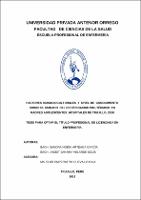| dc.contributor.advisor | Cueva Loyola, Flor Emperatriz | |
| dc.contributor.author | Arteaga García, Sandra Noemi | |
| dc.contributor.author | Velarde Solís, Jhudit Jahaira | |
| dc.creator | Arteaga García, Sandra Noemi | |
| dc.date.accessioned | 2018-07-05T21:38:10Z | |
| dc.date.available | 2018-07-05T21:38:10Z | |
| dc.date.issued | 2018 | |
| dc.identifier.uri | https://hdl.handle.net/20.500.12759/4168 | |
| dc.description.abstract | La investigación es de tipo correlacional y de corte transversal, se realizó con la finalidad de determinar la relación entre los factores biosocioculturales y el nivel de conocimiento sobre el cuidado del recién nacido pre-término en madres adolescentes atendidas en los hospitales de Trujillo. La muestra estuvo constituida por 86 madres del Hospital Regional Docente de Trujillo y el Hospital Belén de Trujillo. Se aplicó un cuestionario sobre los factores biosocioculturales y el nivel de conocimiento sobre el cuidado del recién nacido pre-término en madres adolescentes. Los resultados obtenidos muestran que las madres adolescentes en un 68.6% tienen edades entre 15 a 19 años, son convivientes en un 53.5%, tienen instrucción secundaria en un 43%, son amas de casa en un 53.5% y son primíparas en un 58%. Con respecto al conocimiento sobre el cuidado del recién nacido prematuro el nivel regular y deficiente fue de 50% respectivamente. Según la prueba Chi-cuadrado los factores biosocioculturales no tienen relación con el nivel de conocimiento (p> 0.05). | es_PE |
| dc.description.abstract | The research is of a correlational and cross-sectional type, it was carried out with the purpose of determining the relationship between the biosociocultural factors and the level of knowledge about pre-term newborn care in adolescent mothers attended in Trujillo hospitals. The sample was constituted by 86 mothers of the Regional Teaching Hospital of Trujillo and the Belén Hospital of Trujillo. A questionnaire was applied on biosociocultural factors and the level of knowledge about the care of the preterm newborn in adolescent mothers. The results obtained show that 68.6% of adolescent mothers are between 15 and 19 years old, live together in 53.5%, have secondary education in 43%, are housewives in 53.5% and are primiparous in 58%. With respect to knowledge about premature newborn care, the regular and deficient level was 50% respectively. According to the Chi-square test, biosociocultural factors have no relationship with the level of knowledge (p> 0.05). | en_US |
| dc.description.uri | Tesis | es_PE |
| dc.format | application/pdf | es_PE |
| dc.language.iso | spa | es_PE |
| dc.publisher | Universidad Privada Antenor Orrego | es_PE |
| dc.relation.ispartofseries | T_ENFE_433 | |
| dc.rights | info:eu-repo/semantics/closedAccess | es_PE |
| dc.rights.uri | https://creativecommons.org/licenses/by/4.0/ | es_PE |
| dc.source | Universidad Privada Antenor Orrego | es_PE |
| dc.source | Repositorio Institucional - UPAO | es_PE |
| dc.subject | Factores biosocioculturales | es_PE |
| dc.subject | Nivel de conocimiento | es_PE |
| dc.subject | Madres adolescentes | es_PE |
| dc.title | Factores biosocioculturales y nivel de conocimiento sobre el cuidado del recién nacido pre-término en madres adolescentes. Hospitales de Trujillo, 2018 | es_PE |
| dc.type | info:eu-repo/semantics/bachelorThesis | es_PE |
| thesis.degree.level | Título Profesional | es_PE |
| thesis.degree.grantor | Universidad Privada Antenor Orrego. Facultad de Ciencias de la Salud | es_PE |
| thesis.degree.name | Licenciada en Enfermería | es_PE |
| thesis.degree.discipline | Enfermería | es_PE |
| renati.type | https://purl.org/pe-repo/renati/type#tesis | es_PE |
| renati.level | https://purl.org/pe-repo/renati/level#tituloProfesional | es_PE |
| dc.publisher.country | PE | es_PE |


